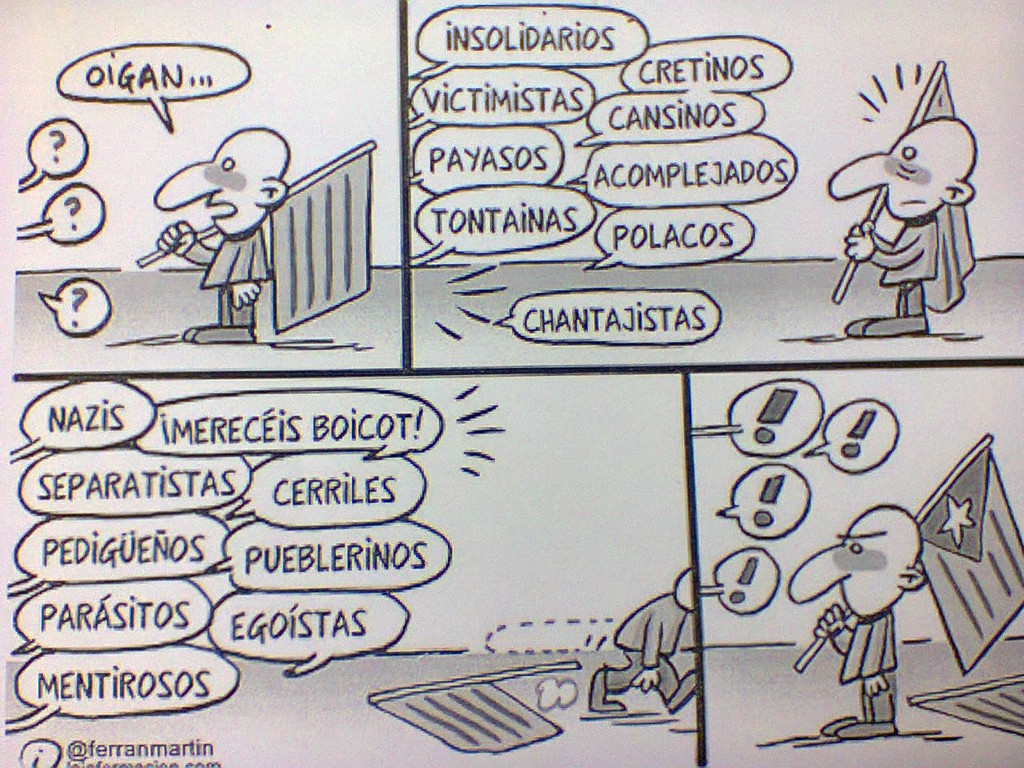Catalan Culture: A matter of independence (2)
If on the previous part of the entry I have tried and sum up the current situation of Catalonia, I am now bound to undertake an attempt of analysis of the possible reasons for independence (and of the possible sceneries it may imply).
It is a fact that Catalonia has never been an independent country throughout its history. After the fall of the Roman empire, indeed, Barcelona and the surrounding area were briefly ruled by the Arabs, which were soon replaced by the Frankish dominion. However, being a small county quite far from the cntre of the Holy Roman Empire, Catalonia slowly but relentlessly gained a certain extent of independence, until in 878 one of the local noblemen, Guifrè el Pilòs, managed to unite the Catalan lands in a small county boasting a good degree of autonomy (though it was not to be considered an independent country). The earls of Barcelona, heirs of Guifré, gradually expanded their dominions until, in 1137, Ramon Berenguer IV married the princess of Aragon. In this way, the Catalan county was absorbed by the nearby kingdom of Aragon: though maintaining a certain autonomy and expanding in some way its influence (in this period Barcelona became one of the most powerful cities in the Mediterranean sea), Catalonia gave up, therefore, the political independence.

Since that day, indeed, Barcelona and the neighbouring lands have been part of a wider political state (be it the kingdom of Aragon or of Castile, which later became Spain). However, it is certainly true that Catalan people have succeeded in preserving most of their tradition untouched: a language, which despite being spoken by just 3 million people is still alive and kicking, a literature which has witnessed a revival in the last two centuries, and a series of popular customs which are of undeniable interest and deserve to be safeguarded. It has not always been so, actually: during the dictatorship of Primo de Rivera (in the 1920s) and Francisco Franco (since 1939 to 1975), indeed, a strong attempt was made to crush the local autonomies, especially in Catalonia and Basque Country. Catalan language could not be used in documents nor broadcasting, while traditional celebrations were strictly forbidden. That is probably one of the reason which made the claim for independence flare up even more strongly. Nevertheless, the cultural element appear nowadays to be quite marginal in the debate for independence. As I have already said, political and economic matters appear to be ruling the roost.
On which grounds are Catalan people going to obtain their independence? Of course, they point at the principle of self-determination (according to which every population has the right to decide about its belonging to a country or to a political organisation) as the basis for their claim. On this point, I am quite inclined to agree with those who state that the decision about the future of Catalonia should be up to Catalan people. However, this verdict must necessarily come from the result of a democratic vote carried out according to the rules of the Spanish country, to which Catalonia still belongs. What is more, this vote must be unconditioned under all points of view, which means that no political pressure should be put on the voters. At the same time, this condition also implies that the voters must be informed of the possible consequences of their decision (and sometimes I am really inclined to think that some Catalan politician have no idea of these consequences, or at least they do not make them clear to Catalan people). One of the example would be the possible exclusion of Catalonia from the European Union (which is, indeed, one of the reasons advanced by those against independence). At the moment of voting, then, people should be aware of the possible fate of a Catalonia out of Spain and (possibly) from the European Union.

So far I have exposed what I think is going to be the scenery which could possible turn into reality in the following years (if not months). However, I personally believe that would not be the best solution for the problem. At least in my view, indeed, standing up for itself in a world which is quickly growing more globalised would be a step back for Catalonia, at least under an economic and political point of view. Moreover, this fact may imply a chain reaction with possibly devastating consequences for the Spanish country: if Catalonia has been given the green light to decide about independence, why should not the Basque Country do the same? And if so, why should not a similar claim be aroused also in, say, Asturias or Galicia?. A political scenery of this kind would bring Spain, I am afraid, on the verge of a collapse, under all points of view. Is there an alternative solution, then?
Yes, at least in my opinion (but of course I have been living here for just a few months, therefore I cannot claim to have a complete view of the matter). The way I see it, the perfect answer to the claim would be a consistent improvement of the autonomic statute which the Spanish country is bound to allow to Catalonia. If on both sides there will be willingness and openness to a negotiation (but in the last few years it has not been so, at least on behalf of the Spanish government) a fruitful agreement may finally be reached. But, as the English would say, though the proverb would be more adequate to Argentinean than to Spanish (and Catalan) people...it always takes two to tango!
Photo gallery
Want to have your own Erasmus blog?
If you are experiencing living abroad, you're an avid traveller or want to promote the city where you live... create your own blog and share your adventures!
I want to create my Erasmus blog! →





Comments (0 comments)